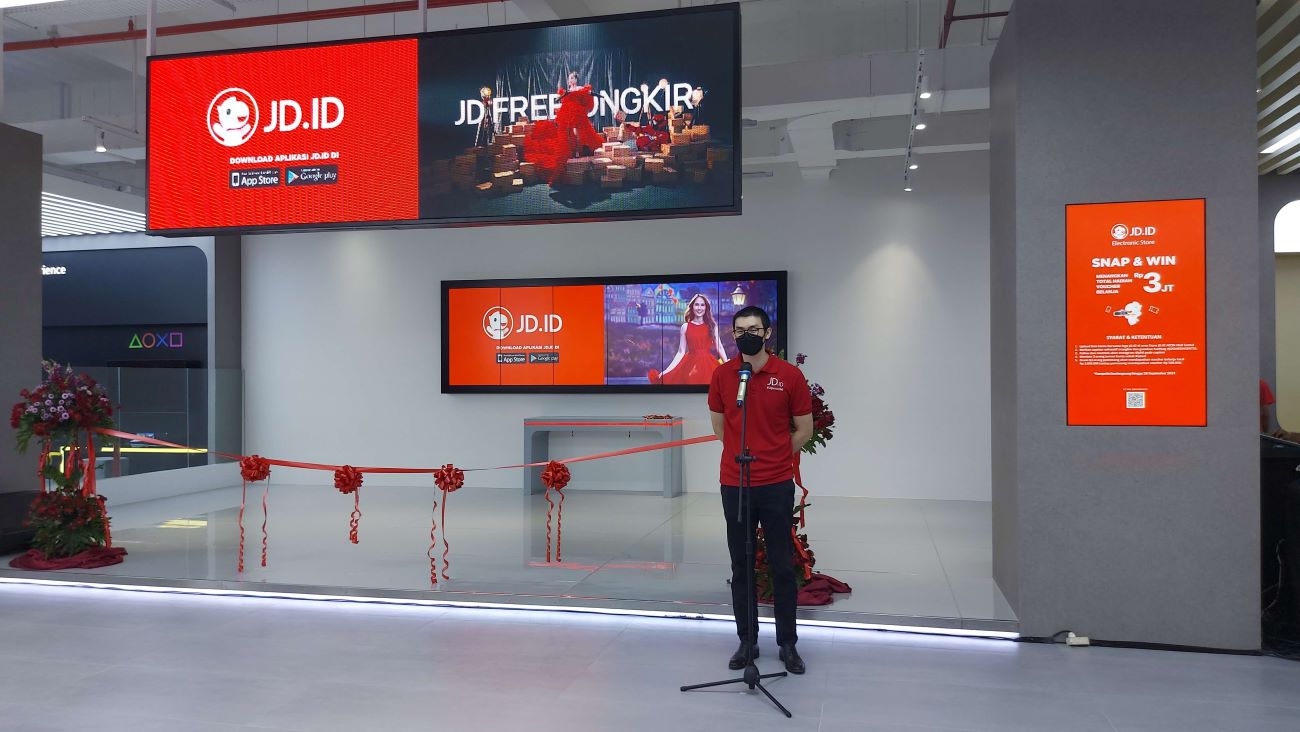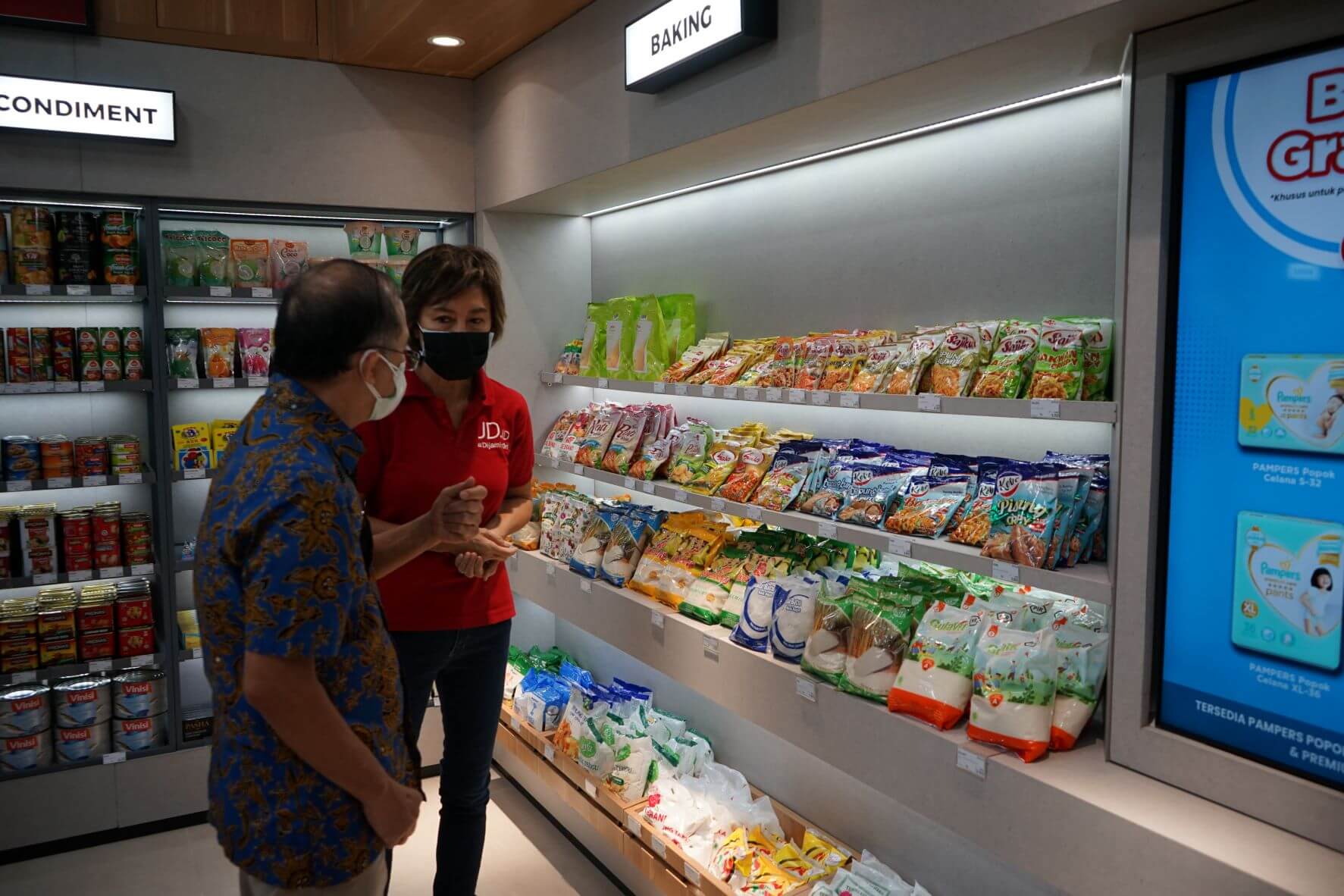JD.id to strengthen its omnichannel strategy by opening offline stores in several locations in Jabodetabek. Since 2018, JD.id aims to become the leading e-commerce platform that integrates the largest offline and online ecosystems in Indonesia through this initiative.
To date, JD.id has two flagship outlets for electronics (Electronic Store) and minimarkets (JD HUB) across Greater Jakarta. There are five JD.id Electronic Store operating, with the recent opening at AEON Mall Sentul City, Bogor. Meanwhile, JD HUB is now available in three locations, with the most recent opening at The Elements Apartment Kuningan, Jakarta.
JD.id’s Head of Offline Business, Evyette Tung said to DailySocial, JD.id’s entrance into offline stores combines an O2O strategy with objective to increase offline business sales through the online platforms, as well as increasing offline business traffic through conversion to online platform’s pick-up points.
In addition, this business strategy is also due to the company’s effort to provide convenience and comfort for consumers in choosing the shopping platform that best suits their preferences. Whether it’s buying products online in the JD.id application, then picking them up at offline stores, or choosing and buying products from the nearest offline stores, then sending them to the destination address with the “Nearby Shops” feature in the JD.id application.
Without any further detail, she said the company choose electronic and minimarket categories as they were recorded to have high demand, both before and during the pandemic.
Supported by MarkPlus Insight’s research findings entitled “Consumer Behavior of E-Commerce in 2021”, revealed the fashion and electronics categories are the product category with the highest selling value. Fashion is recorded to have the highest sales volume which is predicted to reach $10.4 billion in 2022.
Meanwhile, the electronics category has great selling value potential with the higher price range than fashion. It is predicted that the selling value is to reach $7.9 billion in 2022.
“Through JD HUB and JD.ID Electronic Store, JD.ID intends to build an integrated online and offline shopping ecosystem, therefore, to create closer interaction with consumer, has becoming a safe, fun shopping solution amid this pandemic situation,” Evyette said.
She continued, JD HUB comes with the concept of a minimarket with a strategic location, a spacious and comfortable store. Like other minimarkets, JD HUB sells various food products, packaged drinks, fresh products, and daily necessities.
Also, JD.id Electronic Store to answer consumer electronic needs, such as gadgets, laptops, home appliances, home living, and furniture. In the JD.id Electronic Store at AEON Mall Sentul City, Bogor, for example, not only display area, it also presents an experience area for gaming, smart living, kitchen, bedroom, and center of activity facilities for various JD.id events.
“These two outlets apply an O2O business strategy which is also supported by the “Nearby Shops” feature, therefore, customers can do not only face-to-face shopping, but also anytime and anywhere via their smartphones.”
After AEON Mall Sentul City, the company will launch the next 6th outlet for the JD.id Electronic Store in the Sudirman area, Jakarta in the near future. The target is yet to be revealed by the end of this year.
“This year, the development and expansion of the O2O business will still be our priority, from the development in the Greater Jakarta area, followed by development in various big cities in Indonesia,” she said.
Its presence at AEON Mall Sentul City is an implementation of the strategic collaboration between JD.id and the AEON Mall Indonesia Group. The form of this collaboration is the opening of JD.id Electronic Store outlets at several AEON locations in Jabodetabek; collaborative development of O2O outlets; development of the Nearby Shops ecosystem for AEON Mall tenants; and symbiotically bring customer traffic to each other.
Meanwhile, JD HUB is the implementation of a strategic partnership with Sinarmas Land, to fill retail spaces in Sinarmas’ projects. In addition to the development of retail space, JD.id will also provide a digital payment feature (billing payment platform) for residents in townships and Sinarmas Land projects, as well as provide a digital-marketing platform for Sinarmas Land in promoting its property products, such as residential, office, and retail space, through virtual showroom technology and webinar events.
Entering O2O segment
JD.id’s closest competitor that is also aggressively implementing an omnichannel strategy is Blibli. Although Blibli only has one offline outlet that has been operated, Blibli is also aggressively implementing an O2O strategy for its online groceries services.
It was marked by the acquisition of a 51% majority stake in Supra Boga Lestari, the operator of the Ranch Market supermarket which was announced last week (16/9). Currently Ranch Market operates 48 outlets throughout Indonesia.
In a media conference at the end of 2020, Blibli said that the daily staple category was among the best-selling. Although not detailed with numbers, the number of transactions at BlibliMart has tripled during the pandemic.
Minister of Trade, Muhammad Lutfi said, sales of fresh food products in e-commerce services will generate a value of more than Rp. 21 trillion in 2021. This is a higher number from the same period in the previous year of Rp18 trillion.
When this achievement is successfully inscribed by the ecosystem, Lutfi is steady with a projected achievement of 108 trillion Rupiah in the next five years. Obviously this is not a small number for a relatively new line of industry.
–
Original article is in Indonesian, translated by Kristin Siagian



